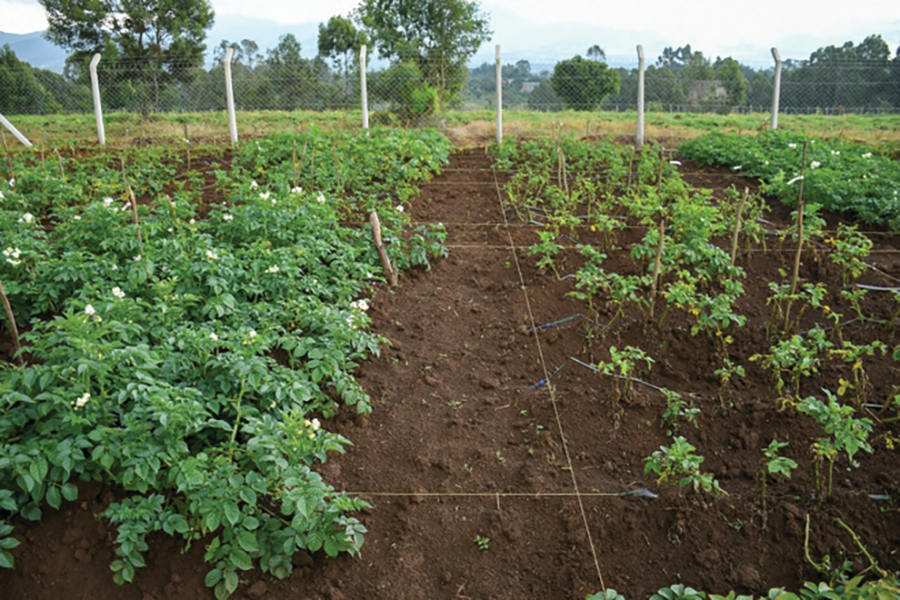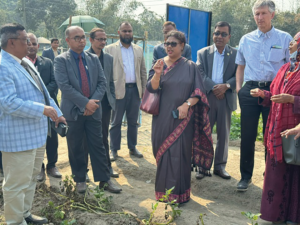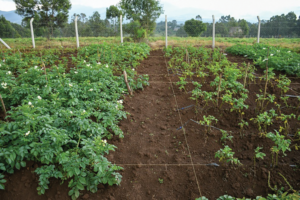
Promising development for late blight resistance
The 3R-gene potato under development by the Feed the Future Biotechnology Potato Partnership has shown impressive resistance to late blight during multiple field trials conducted in Bangladesh, Indonesia, Kenya, Nigeria and the U.S.
Six varieties of the late blight resistant (LBR) potato have been developed with the insertion of a three-gene stack of resistance genes taken from wild potato species.
“There are hundreds of resistance genes in wild potato,” said Dave Douches, project director and head of the potato breeding and genetics program at Michigan State University (MSU). “Our project works with two different 3R-gene stacks, and we are confident both will provide durable resistance to potato’s biggest threat: late blight.”
Worldwide, annual potato crop losses of between 15% and 30% are attributed to late blight disease, resulting in a $6.7 billion global cost, according to MSU. In developing countries, including those in Southeast Asia and Africa, potato production and storage length are limited by late blight effects.
Research indicates that the 3R-gene LBR potato will stabilize crop yields and cut reliance on fungicides by up to 90%, greatly reducing human and environmental health risks while providing a resilient solution to the disease.

WORLDWIDE REACH
The Feed the Future Biotechnology Potato Partnership is a five-year, $6.48 million cooperative agreement between MSU, the U.S. Agency for International Development, the J.R. Simplot Co., and other global institutions to develop and bring to market improved potato products in farmer- and consumer-preferred varieties.
The project has developed the LBR potato in Diamant and Granola varieties. Simplot Plant Sciences, based in Boise, Idaho, provided the 3R-gene construct and lead events to MSU for further analysis and research before the varieties were imported into Bangladesh, Indonesia and Nigeria.
“In Indonesia, both the Granola and Diamant varieties have been under confined field trial for several years,” Douches said. “Nigeria conducted their first field trial in 2022 and Bangladesh last year. Both Nigeria and Bangladesh are working with the Diamant variety, which is farmer-preferred.”
The other 3R-gene construct was developed by the International Potato Center (CIP) in Kenya. Several varieties have been transformed, including Victoria/Asante, Tigoni, Desiree and Shangi. Field trials in both Kenya and Nigeria of these varieties are ongoing.
“Our goal is to commercially release at least one variety, farmer-preferred, for each country by the end of 2026,” Douches said. “In Kenya, we have obtained all the data required to submit the regulatory dossier to the proper authorities. We expected the other countries to conclude multi-location confined field trials in the next year and a half.”

Douches said that timetable should be met if the biotech regulatory environment remains favorable.
“The potato is generating a lot of excitement in these countries,” he said.
“The farmers are especially excited when they see the LBR potato next to the conventional variety. The 3R-gene is late blight-free, while the conventional plant right alongside has completely succumbed to the disease. It’s visually impactful.”
LASTING IMPACT
The project has captured the interest of high-profile visitors including government dignitaries, regulatory authorities, media, value chain stakeholders and, of course, farmers.
Douches recently traveled to Bangladesh where he accompanied Wahida Akter, secretary of the country’s Ministry of Agriculture, on a tour of the confined field trial in Rangpur.
“She is an amazing woman and was quite excited by what she witnessed,” he said. “Many don’t realize how important potatoes are to Bangladesh. They rank seventh in global potato production — amazing when you consider their land mass is slightly larger than the state of Idaho.”
Douches said MSU is focused on supporting in-country research partners so that they can continue using biotechnology to sustain the potato value chain and improve farmers’ livelihoods when the project ends.
The Feed the Future Biotechnology Potato Partnership is a collaboration between MSU; CIP; the University of Idaho; African Agricultural Technology Foundation and partner country National Agricultural Research Systems; Bangladesh Agricultural Research Institute; National Research and Innovation Agency Indonesia; Kenya Agriculture and Livestock Research Organization; and Nigeria’s National Root Crops Research Institute. The project also works with local partner country organizations such as Farming Future Bangladesh.
The project is supported by Feed the Future, the U.S. government’s global hunger and food security initiative.
Janet Fierro is the communications manager for the Feed the Future Biotechnology Potato Partnership. Dave Douches has led the potato breeding and genetics project at MSU since 1988.














